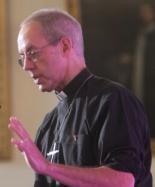It is rare that a national newspaper editorial exposes its prejudices so clearly. And, tempting though it is to just smile grimly and let it pass, here goes (again).
Here is how the concluding judgements of Friday's Independent editorial on the Archbishop of Canterbury's involvement in politics went:
While anxiety over child poverty is admirable, public pronouncements on purely political issues in which his organisation has no direct involvement are as unconstructive as they are inappropriate. The question is neither Archbishop Welby’s motivations nor his capabilities; as a former oil executive and a member of the mettlesome Commission on Banking Standards, he has both the background and the acuity to make an informed contribution. The question is whether he should do so.

For The Independent, even when we agree with him, the answer must be no. For all his fine qualities – many of which were on display in yesterday’s gracious, candid response to the Wonga embarrassment – Archbishop Welby is still the unelected leader of a minority institution which enjoys disproportionate influence on the basis of history alone. His efforts to reclaim the initiative and make the Church relevant again are understandable. But they are also erroneous.
This is no swipe at religion, but such matters are a private affair, and spiritual leaders – for all the authority they may have among their own – have no business in mainstream politics. That bishops still sit in the House of Lords is an anachronism that makes a mockery of British democracy. If Archbishop Welby wishes the Church of England to support credit unions, it is his prerogative to act accordingly, but there his legitimacy ends.
The italics are mine. The patronising assumptions about private-public opinions are those of the anonymous author.
First, unlike newspaper editorial writers, the church does have a 'direct involvement' in the issues we bang on about – which is why we bang on about them. We have clergy and people in every community of the country and our intelligence about 'real lives' and the impact of policy on them is rooted and informed. We don't just stand at a distance and pontificate like… er… editorial writers? Since when was child poverty or welfare reform purely a 'political' issue and not a 'human' or 'social' issue? And who else should, on this basis, be kept muted: community leaders, journalists, rabbis, sportsmen, newspaper editors?
Secondly, when I last looked, all the above were unelected. Or is the Independent really suggesting that only elected politicians should have a voice in society and how it is run? Is it really suggesting that there is some neutral ground for a world view that is shared by non-religionists, but not by those who start from a religious world view? How did such nonsense get through the editorial desk? Oh, I see…
Thirdly, yes it is a swipe at religion. Religion is being singled out for silence. And on what basis? That it is a 'private affair'. It beggars belief that this old chestnut still pops up in rational minds. The division into 'private' and 'public' is artificial. On what basis is a politicians dogma to be accepted as relevant, but an Archbishop's as mere opinion? And, even if this were to be seen as remotely valid, why is one opinion to be privileged above another?
The final swipe at the church's involvement in the legislature exposes the real point of the piece – which is not about the validity of the Archbishop of Canterbury's role in using his office to speak about social ills, but about the matter of disestablishment. Well, write a leader comment about that, then, but don't mix it up with nonsense about private opinion, elected voices and ignorance about the church's engagement in the real world of our local communities.
(And I like the Independent. I thought it was a bit brighter than this.)
 Posted with Blogsy
Posted with Blogsy
